WASHINGTON – With bipartisan agreement to repeal and replace the Medicare Sustainable Growth Rate formula already on the table, the next battle facing passage of the legislation will be how to pay for it.
Republican leadership of the House Energy and Commerce Health Subcommittee made it clear at a Jan. 21 hearing that a permanent SGR fix would not move forward without offsets to cover the estimated $140 billion price tag for the current agreement.
Finding the offsets “will not be easy, but it is a task we must embrace,” Subcommittee Chairman Joseph Pitts, (R-Pa.), said in opening the first of two days of hearings on SGR repeal. “Some argue that SGR reform does not need to be paid for. I respectfully disagree.”
Rep. Pitts noted that 98% of enacted SGR patches, spanning 120 of the 123 months worth of so-called “doc-fix” legislation, have been paid for with offsets.
Democrats on the subcommittee were critical of that hard line, noting that the House recently passed a bill to change definition of full-time employment in the Affordable Care Act to 40 hours a week, a bill estimated to cost more than $50 billion, without any cost offsets. They also suggested to look elsewhere in government to find the offsets.
“But a fix to the SGR that harms Medicare beneficiaries because of the insistence of offsets that reduce benefits and limit access is not an acceptable tradeoff,” said the subcommittee’s ranking member, Rep. Gene Green, (D-Tex.).
Witnesses who testified on Jan. 21 agreed that it should not be passed without offsets, though the common message was not to put the burden on beneficiaries through higher premiums or reduction of services.
Alice Rivlin, Ph.D., director of the Engelberg Center for Health Care Reform at the Brookings Institution and cochair of the delivery system reform initiative at the Bipartisan Policy Center, offered a number of potential cost-saving reforms, including income-adjusting premiums, accelerating of payment reform, rewarding seniors for choosing generic drugs, more competitive bidding, and accelerating the time frame for higher payments to providers participating in alternative payment mechanisms highlighted in the legislation to 2018 and offering those incentives to all Medicare providers.
“They would move to make Medicare a more efficient program,” Dr. Rivlin, founding director of the Congressional Budget Office, said.
Dr. Rivlin also suggested that strengthening accountable care organizations (ACOs) would help with finding savings offsets, including setting longer-term savings goals rather than resetting baselines every year or eliminating historical or “after-the-fact” attribution of beneficiaries to ACOs.
“The long-term promise of these models won’t be realized if unrealistic short-term pressures for savings make it unlikely that many providers can succeed,” she said. “These are all fixable problems that can be addressed as part of SGR reform.”
Better care coordination also could save Medicare money and contribute to SGR reform funding, according to Marilyn Moon, Ph.D., a fellow at the American Institutes for Research.
Dr. Moon said that there should be incentives that emphasize performing the right care at the right place and at the right time. To that end, she said the notion of bundled payments needs to be carefully examined because of the influence the entity in charge of payments might have.
For example, if a hospital is the lead organization in charge of distributing bundled payments in a coordinated care system, it might be inclined to keep patients in house rather than send them to a more appropriate setting.
There are “a lot of things that need to be worked out,” she said, adding that the SGR legislation could be a good vehicle for it.
On Jan. 22, the Health Subcommittee will hear testimony on SGR reform from a panel of representatives of physician organizations.


